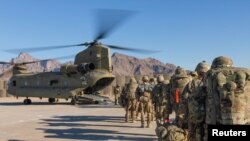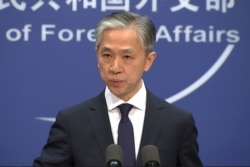Media reports say U.S. President Donald Trump recently received unconfirmed intelligence information indicating that China offered money to nonstate actors in Afghanistan to attack American soldiers.
A senior Trump administration official Thursday confirmed to VOA details of “the declassified intelligence” published by the Axios news website the previous day. The official spoke on condition of anonymity.
“The intelligence was included in the president's briefing on December 17, and Trump was verbally briefed on the matter by national security adviser Robert O’Brien,” according to Axios.
U.S. officials were said to be working to corroborate the intelligence findings, which are likely to fuel tensions between Washington and Beijing.
“It's nothing but fake news aimed to smear China,” Chinese Foreign Ministry spokesman Wang Wenbin said Thursday while responding to the U.S. allegations in the regular news conference. He said the charges were meant to “taint China's image” and damage relations between the two countries.
“We have never started a war with others, not to mention paying nonstate actors to attack other countries,” stressed Wang.
The Chinese spokesman asserted that his country does not get involved in the internal conflicts in Afghanistan and reiterated Beijing’s support for the U.S.-initiated peace and reconciliation process, which seeks an end to two decades of war in the South Asian nation.
“The international community has a fair conclusion on who is flexing muscles, waging proxy wars and stirring up problems that disrupt regional peace and stability,” Wang said, without elaborating.
It was not known immediately whether President-elect Joe Biden has also been briefed on the findings about the alleged Chinese plot.
“Our teams will seek to learn as much as we can about these allegations from the outgoing administration, and this is another illustration of why we need full cooperation, including from the Department of Defense,” an unnamed Biden transition official told CNN.
U.S.-China relations have lately been strained over trade, intellectual property and other issues. Washington has also been highly critical of human rights abuses China is allegedly committing against the Uighur Muslim minority in its western Xinjiang region.
Beijing denies allegations it is suppressing rights of the Muslim community, saying they are part of a Western propaganda campaign aimed at maligning China.
It was unclear whether the so-called nonstate actors China allegedly offered bounties to were part of the Taliban waging a deadly insurgency against the U.S.-backed Afghan government.
Earlier this year, U.S. media reports indicated that Russia allegedly had sought to pay militants linked to the Taliban insurgency in Afghanistan to kill U.S. soldiers.
Trump, however, has not publicly called Russia out on the issue, dismissing the reports as “fake news.”
Skeptics like Michael Kugelman, deputy director of the Asia program at Washington’s Wilson Center, say nothing can be ruled out given how tense and toxic the U.S.-China relationship has become.
“I’m skeptical that China would do such a thing, given that Beijing largely agrees with U.S. policy in Afghanistan and it prefers to keep a low profile there and not rock the boat,” Kugelman told VOA.
“Also, while [China] has a large diplomatic profile in Afghanistan, it doesn’t have much of a security presence and seemingly lacks the network to collude with militants,” he said. “In other words, if Beijing is looking to hit out against the U.S., it’s more likely to do it elsewhere.”
The U.S. is reducing its troops in Afghanistan as part of a deal it signed with the Taliban in February aimed at ending the Afghan war, the longest overseas intervention in U.S. history. The Trump administration says that there will be around 2,500 U.S. soldiers left in Afghanistan by mid-January.
The February agreement requires America and its allies to withdraw all their forces from the country by May 2021. It has also initiated the first direct peace talks between the Taliban and the Afghan government to negotiate a power-sharing deal and a nationwide cease-fire.
The intra-Afghan negotiations started on September 12 and will resume in Qatar on January 5 after a three-week break.
Paris Huang of VOA's Mandarin Service contributed to this report.






